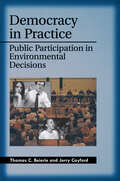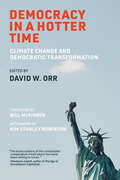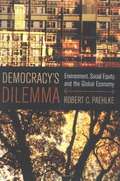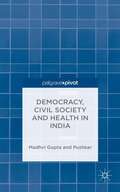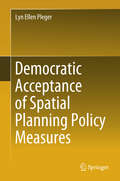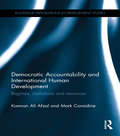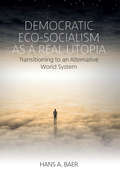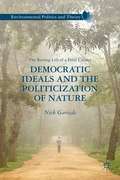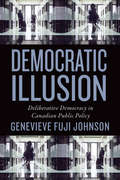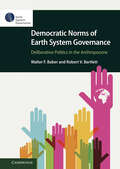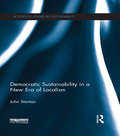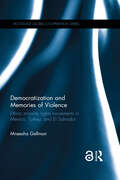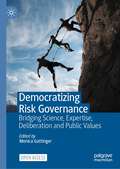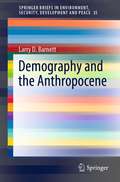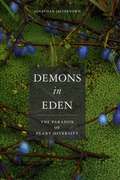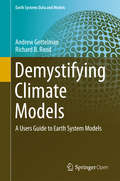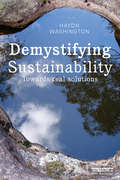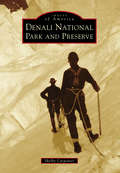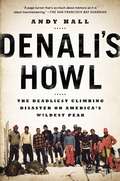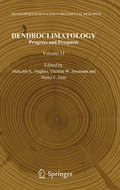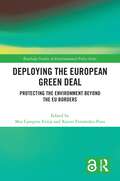- Table View
- List View
Democracy in Practice: Public Participation in Environmental Decisions
by Thomas C. BeierleIn spite of the expanding role of public participation in environmental decisionmaking, there has been little systematic examination of whether it has, to date, contributed toward better environmental management. Neither have there been extensive empirical studies to examine how participation processes can be made more effective. Democracy in Practice brings together, for the first time, the collected experience of 30 years of public involvement in environmental decisionmaking. Using data from 239 cases, the authors evaluate the success of public participation and the contextual and procedural factors that lead to it. Thomas Beierle and Jerry Cayford demonstrate that public participation has not only improved environmental policy, but it has also played an important educational role and has helped resolve the conflict and mistrust that often plague environmental issues. Among the authors' findings are that intensive 'problem-solving' processes are most effective for achieving a broad set of social goals, and participant motivation and agency responsiveness are key factors for success. Democracy in Practice will be useful for a broad range of interests. For researchers, it assembles the most comprehensive data set on the practice of public participation, and presents a systematic typology and evaluation framework. For policymakers, political leaders, and citizens, it provides concrete advice about what to expect from public participation, and how it can be made more effective. Democracy in Practice concludes with a systematic guide for use by government agencies in their efforts to design successful public participation efforts.
Democracy in a Hotter Time: Climate Change and Democratic Transformation
by Kim Stanley RobinsonThe first major book to deal with the dual crises of democracy and climate change as one interrelated threat to the human future and to identify a path forward.Democracy in a Hotter Time calls for reforming democratic institutions as a prerequisite for avoiding climate chaos and adapting governance to how Earth works as a physical system. To survive in the &“long emergency&” ahead, we must reform and strengthen democratic institutions, making them assets rather than liabilities. Edited by David W. Orr, this vital collection of essays proposes a new political order that will not only help humanity survive but also enable us to thrive in the transition to a post–fossil fuel world.Orr gathers leading scholars, public intellectuals, and political leaders to address the many problems confronting our current political systems. Few other books have taken a systems view of the effects of a rapidly destabilizing climate on our laws and governance or offered such a diversity of solutions. These thoughtful and incisive essays cover subjects from Constitutional reform to participatory urban design to education; together, they aim to invigorate the conversation about the human future in practical ways that will improve the effectiveness of democratic institutions and lay the foundation for a more durable and just democracy.ContributorsWilliam J. Barber III, JD, William S. Becker, Holly Jean Buck, Stan Cox, Michael M. Crow, William B. Dabars, Ann Florini, David H. Guston, Katrina Kuh, Gordon LaForge, Hélène Landemore, Frances Moore Lappé, Daniel Lindvall, Richard Louv, James R. May, Frederick W. Mayer, Bill McKibben, Michael Oppenheimer, David W. Orr, Wellington Reiter, Kim Stanley Robinson, Anne-Marie Slaughter
Democracy's Dilemma: Environment, Social Equity, And The Global Economy
by Robert C. PaehlkeThe author calls for a balancing of economic, environmental, and social concerns in the age of global economic integration.
Democracy, Civil Society, and Health in India
by Madhvi Gupta PushkarIndia's health failures remain visible and pronounced despite high rates of economic growth since the 1980s and more than six decades of democratic rule. The authors address the key issues that emerge from the country's health situation, speculating on what it will take for low-income groups to begin claiming for better social services
Democratic Acceptance of Spatial Planning Policy Measures
by Lyn Ellen PlegerThis book examines the democratic acceptance of spatial planning measures, using Switzerland as a case study. The currently inefficient land use in industrialised countries calls for new spatial planning policies. Yet governments have largely failed to implement innovative policy measures, which may be due to a lack of democratic acceptance. To date, little is known about the democratic acceptance of spatial planning measures. Switzerland offers a promising candidate because of its direct-democratic system, which allows citizens’ preferences for specific policy measures to be directly measured. In this work, the democratic acceptance of spatial planning instruments is investigated from various perspectives in the form of original empirical studies, which are embedded in an innovative conceptual framework. It demonstrates that not only spatial planning instruments in general, but also incentive-based instruments in particular, generally enjoy high acceptance. This finding is remarkable, considering the fact that efficient land use instruments have only been marginally implemented. Addressing the needs of both academics and land use practitioners in the private and public sector, the book shows that in order to improve the democratic acceptance of spatial planning measures, attention must be paid to their context, content and the means by which that content is provided.
Democratic Accountability and International Human Development: Regimes, institutions and resources (Routledge Explorations in Development Studies)
by Kamran Ali Afzal Mark ConsidineScholars and policymakers have long known that there is a strong link between human development and spending on key areas such as education and health. However, many states still neglect these considerations in favour of competing priorities, such as expanding their armies. This book examines how states arrive at these decisions, analysing how democratic accountability influences public spending and impacts on human development. The book shows how the broader paradigm of democratic accountability – extending beyond political democracy to also include bureaucratic and judicial institutions as well as taxation and other modes of resource mobilisation – can best explain how states allocate public resources for human development. Combining cross-country regression analysis with exemplary case studies from Pakistan, India, Botswana and Argentina, the book demonstrates that enhancing human capabilities requires not only effective party competition and fair elections, but also a particular nesting of public organisational structures that are tied to taxpaying citizens in an undisturbed chain of accountability. It draws out vital lessons for institutional design and our approach to the question of human development, particularly in the less developed states. This book will be of great interest to postgraduate students and researchers in the fields of political economy, public policy, governance, and development. It also provides valuable insights for those working in the international relations field, including inside major aid and investment organisations.
Democratic Eco-Socialism as a Real Utopia: Transitioning to an Alternative World System
by Hans A. BaerAs global economic and population growth continues to skyrocket, increasingly strained resources have made one thing clear: the desperate need for an alternative to capitalism. In Democratic Eco-Socialism as a Real Utopia, Hans Baer outlines the urgent need to reevaluate historical definitions of socialism, commit to social equality and justice, and prioritize environmental sustainability. Democatic eco-socialism, as he terms it, is a system capable of mobilizing people around the world, albeit in different ways, to prevent on-going human socio-economic and environmental degradation, and anthropogenic climate change.
Democratic Ideals And The Politicization Of Nature
by Nick GarsideDemocratic Ideals and the Politization of Nature introduces the feral citizen as a response to a perceived need to revitalize the disruptive, critical, and exploratory nature of democratic culture. By learning from the traditions of aimless walking and by embracing a consciously feral method of political engagement, radically-democratic citizens can prompt political moments that create conditions where the primacy of the political can be performed, realized and defended. Ultimately, this book seeks not to solve the problems and paradoxes of democracy but to assist in unleashing and celebrating them. Garside concludes that using the methodology of feral citizenship inspired by environmentalism and democratic articulation to reprioritize the political within the green public sphere, citizens can reclaim necessary (and welcome) tensions between representations of nature and political citizenship.
Democratic Illusion
by Genevieve Fuji-JohnsonThe theory of deliberative democracy promotes the creation of systems of governance in which citizens actively exchange ideas, engage in debate, and create laws that are responsive to their interests and aspirations. While deliberative processes are being adopted in an increasing number of cases, decision-making power remains mostly in the hands of traditional elites.In Democratic Illusion, Genevieve Fuji Johnson examines four representative examples: participatory budgeting in the Toronto Community Housing Corporation, Deliberative Polling by Nova Scotia Power Incorporated, a national consultation process by the Canadian Nuclear Waste Management Organization, and public consultations embedded in the development of official languages policies in Nunavut. In each case, measures that appeared to empower the public failed to challenge the status quo approach to either formulating or implementing policy.Illuminating a critical gap between deliberative democratic theory and its applications, this timely and important study shows what needs to be done to ensure deliberative processes offer more than the illusion of democracy.
Democratic Norms of Earth System Governance: Deliberative Politics in the Anthropocene (Elements In Earth System Governance Ser.)
by Walter F. Baber Robert V. BartlettDeliberative democracy is well-suited to the challenges of governing in the Anthropocene. But deliberative democratic practices are only suited to these challenges to the extent that five prerequisites – empoweredness, embeddedness, experimentality, equivocality, and equitableness – are successfully institutionalized. Governance must be: created by those it addresses, applicable equally to all, capable of learning from (and adapting to) experience, rationally grounded, and internalized by those who adopt and experience it. This book analyzes these five major normative principles, pairing each with one of the Earth System Governance Project's analytical problems to provide an in-depth discussion of the minimal conditions for environmental governance that can be truly sustainable. It is ideal for scholars and graduate students in global environmental politics, earth system governance, and international environmental policy. This is one of a series of publications associated with the Earth System Governance Project. For more publications, see www.cambridge.org/earth-system-governance.
Democratic Sustainability in a New Era of Localism (Routledge Studies in Sustainability)
by John StantonChange and development are going on all around us. On both an international platform, as well as at the local governmental and community level, governments, decision and policy makers constantly strive to improve the world in which we live, seeking to make it better and to improve quality of life. This book focuses on such development in the context of localism in the UK. It strips the principle of local sustainability down to its constituent parts and considers the extent to which it can be said to be central to local life. As part of this, it presents the case for the importance of accountability and citizen participation in achieving objectives aligned with sustainability, and illustrates the relationships that these principles share. On this foundation, it evaluates local government in the UK, as well as examples of community-led regeneration initiatives and bodies, and seeks to determine both the nature of their pursuit of sustainability and the extent to which accountability and citizen participation play a part in that pursuit. It shows that local sustainability is enhanced by accountability and citizen participation; those principles ensuring that local people can be central to the process. Whilst its evaluations of local democratic systems in the UK reveal certain issues as regards the extent to which this is reflected in practice, it at least demonstrates an enthusiasm and awareness of the important role that accountability and citizen participation can play in the process of local sustainability. The book is aimed at legal academics, with relevance also to students in law, environmental politics and sustainable development, as well as those working in government policy and political practice.
Democratization and Memories of Violence: Ethnic minority rights movements in Mexico, Turkey, and El Salvador (ISSN)
by Mneesha GellmanEthnic minority communities make claims for cultural rights from states in different ways depending on how governments include them in policies and practices of accommodation or assimilation. However, institutional explanations don’t tell the whole story, as individuals and communities also protest, using emotionally compelling narratives about past wrongs to justify their claims for new rights protections. Democratization and Memories of Violence: Ethnic minority rights movements in Mexico, Turkey, and El Salvador examines how ethnic minority communities use memories of state and paramilitary violence to shame states into cooperating with minority cultural agendas such as the right to mother tongue education. Shaming and claiming is a social movement tactic that binds historic violence to contemporary citizenship. Combining theory with empirics, the book accounts for how democratization shapes citizen experiences of interest representation and how memorialization processes challenge state regimes of forgetting at local, state, and international levels. Democratization and Memories of Violence draws on six case studies in Mexico, Turkey, and El Salvador to show how memory-based narratives serve as emotionally salient leverage for marginalized communities to facilitate state consideration of minority rights agendas.This book will be of interest to postgraduates and researchers in comparative politics, development studies, sociology, international studies, peace and conflict studies and area studies.
Democratization and Memories of Violence: Ethnic minority rights movements in Mexico, Turkey, and El Salvador (Routledge Global Cooperation Series)
by Mneesha GellmanEthnic minority communities make claims for cultural rights from states in different ways depending on how governments include them in policies and practices of accommodation or assimilation. However, institutional explanations don’t tell the whole story, as individuals and communities also protest, using emotionally compelling narratives about past wrongs to justify their claims for new rights protections. Democratization and Memories of Violence: Ethnic minority rights movements in Mexico, Turkey, and El Salvador examines how ethnic minority communities use memories of state and paramilitary violence to shame states into cooperating with minority cultural agendas such as the right to mother tongue education. Shaming and claiming is a social movement tactic that binds historic violence to contemporary citizenship. Combining theory with empirics, the book accounts for how democratization shapes citizen experiences of interest representation and how memorialization processes challenge state regimes of forgetting at local, state, and international levels. Democratization and Memories of Violence draws on six case studies in Mexico, Turkey, and El Salvador to show how memory-based narratives serve as emotionally salient leverage for marginalized communities to facilitate state consideration of minority rights agendas. This book will be of interest to postgraduates and researchers in comparative politics, development studies, sociology, international studies, peace and conflict studies and area studies.
Democratizing Global Climate Governance
by Hayley Stevenson John S. DryzekClimate change presents a large, complex and seemingly intractable set of problems that are unprecedented in their scope and severity. Given that climate governance is generated and experienced internationally, effective global governance is imperative; yet current modes of governance have failed to deliver. Hayley Stevenson and John Dryzek argue that effective collective action depends crucially on questions of democratic legitimacy. Spanning topics of multilateral diplomacy, networked governance, representation, accountability, protest and participation, this book charts the failures and successes of global climate governance to offer fresh proposals for a deliberative system which would enable meaningful communication, inclusion of all affected interests, accountability and effectiveness in dealing with climate change; one of the most vexing issues of our time.
Democratizing Risk Governance: Bridging Science, Expertise, Deliberation and Public Values
by Monica GattingerThis open access book features contributions from a multidisciplinary team of leading and emerging scholars focused on democratization of risk assessment, management, and communication. The volume identifies and sheds light on key risk governance dilemmas related to public trust, risk perception and public participation. The first part of the book articulates the relationship among science, expertise, deliberation and public values, featuring an in-depth analysis of the concept of ‘motivated reasoning,’ and the role of trust, values and worldviews in understanding and addressing contemporary controversies over risk decision-making. The volume’s second part features eight case studies from three policy fields – energy, genomics, and public health – and a special section dedicated to vaccine decision-making for Covid-19. Chapters analyze the level, nature and mechanisms of public involvement in risk decision-making, assessing its contribution to the effectiveness and legitimacy of decisions. The case studies focus predominantly on Canada, but they draw on global scholarship and are of direct relevance for scholars and practitioners of risk governance in any country.
Demography and the Anthropocene (SpringerBriefs in Environment, Security, Development and Peace #35)
by Larry D. BarnettEnvironmentalists devote little attention at the moment to the size and growth of the human population. To counter this neglect, the monograph (i) includes original graphs showing population size and growth since 1920 in the world as a whole and the United States; (ii) assembles evidence tying the increasing number of people to ecosystem deterioration and its societal consequences; and (iii) analyzes sample-survey data to ascertain whether the current disregard of population pressures by U.S. environmentalists reflects the thinking of Americans generally. However, even if a nation took steps primarily intended to lower childbearing and immigration, the findings of social science research indicate that the steps would not have a substantial, lasting impact. The discussion, which suggests an indirect way by which government may reduce fertility, underlines for environmental scholars the importance of studying their subject in a multidisciplinary, collaborative setting.
Demons in Eden: The Paradox of Plant Diversity
by Jonathan SilvertownJonathan Silvertown here explores the astonishing diversity of plant life in regions as spectacular as the verdant climes of Japan, the lush grounds of the Royal Botanical Gardens at Kew, the shallow wetlands and teeming freshwaters of Florida, the tropical rainforests of southeast Mexico, and the Canary Islands archipelago, whose evolutionary novelties--and exotic plant life--have earned it the sobriquet the Galápagos of botany. Along the way, Silvertown looks closely at the evolution of plant diversity in these locales and explains why such variety persists in light of ecological patterns and evolutionary processes. In novel and useful ways, he also investigates the current state of plant diversity on the planet to show the ever-challenging threats posed by invasive species and humans. This paperback edition will include an entirely new chapter on the astonishing diversity of plant life in the Western Cape of South Africa that focuses on fynbos, a vegetation endemic to the Cape. Bringing the secret life of plants into more colorful and vivid focus than ever before, Demons in Eden is an empathic and impassioned exploration of modern plant ecology that unlocks evolutionary mysteries of the natural world.
Demystifying Climate Models: A Users Guide to Earth System Models (Earth Systems Data and Models #2)
by Andrew Gettelman Richard B. RoodThis book demystifies the models we use to simulate present and future climates, allowing readers to better understand how to use climate model results. In order to predict the future trajectory of the Earth’s climate, climate-system simulation models are necessary. When and how do we trust climate model predictions? The book offers a framework for answering this question. It provides readers with a basic primer on climate and climate change, and offers non-technical explanations for how climate models are constructed, why they are uncertain, and what level of confidence we should place in them. It presents current results and the key uncertainties concerning them. Uncertainty is not a weakness but understanding uncertainty is a strength and a key part of using any model, including climate models. Case studies of how climate model output has been used and how it might be used in the future are provided. The ultimate goal of this book is to promote a better understanding of the structure and uncertainties of climate models among users, including scientists, engineers and policymakers.
Demystifying Sustainability: Towards Real Solutions
by Haydn WashingtonWhat is sustainability? Much has been said about the terms ‘sustainability’ and ‘sustainable development’ over the last few decades, but they have become buried under academic jargon. This book is one of the first that aims to demystify sustainability so that the layperson can understand the key issues, questions and values involved. Accessible and engaging, the book examines the ‘old’ sustainability of the past and looks to the future, considering how economic, ecological and social sustainability should be defined if we are to solve the entwined environmental, economic and social crises. It considers if meaningful sustainability is the same as a ‘sustainable development’ based on endless growth, examining the difficult but central issues of overpopulation and overconsumption that drive unsustainability. The book also explores the central role played by society’s worldview and ethics, along with humanity’s most dangerous characteristic – denial. Finally, it looks to the future, discussing the ‘appropriate’ technology needed for sustainability, and suggesting nine key solutions. This book provides a much-needed comprehensive discussion of what sustainability means for students, policy makers and all those interested in a sustainable future.
Denali National Park and Preserve
by Shelby CarpenterDenali means "The High One" in Athabascan. Standing at 20,237 feet, Denali is the tallest mountain in North America and has roughly 14,000 feet of vertical relief from base camp to summit--more even than Mount Everest. While native populations had lived within the boundaries of today's Denali National Park and Preserve for over 7,000 years, white settlers only arrived en masse starting in the 1890s. When they did arrive, it was to chase after Denali's abundant game supply and placer gold in the Kantishna mining area. Only a handful of renegades made attempts on the peak at the turn of the century. Setting off with two thermoses of hot chocolate and six donuts--and a 14-foot spruce pole to set on the summit--the "Sourdough Expedition" reached the mountain's north peak in 1910. Today, Denali draws over a thousand climbers each year, and the park provides a safe haven for wildlife and a beautiful natural playground for other backpackers and explorers.
Denali's Howl: The Deadliest Climbing Disaster on America's Wildest Peak
by Andy HallIn the summer of 1967, twelve young men ascended Alaska’s Mount McKinley—known to the locals as Denali. Engulfed by a once-in-alifetime blizzard, only five made it back down. Andy Hall, a journalist and son of the park superintendent at the time, was living in the park when the tragedy occurred and spent years tracking down rescuers, survivors, lost documents, and recordings of radio communications. In Denali’s Howl, Hall reveals the full story of the expedition in a powerful retelling that will mesmerize the climbing community as well as anyone interested in mega-storms and man’s sometimes deadly drive to challenge the forces of nature.
Dendroclimatology
by Thomas W. Swetnam Malcolm K. Hughes Henry F. DiazA top priority in climate research is obtaining broad-extent and long-term data to support analyses of historical patterns and trends, and for model development and evaluation. Along with directly measured climate data from the present and recent past, it is important to obtain estimates of long past climate variations spanning multiple centuries and millennia. These longer time perspectives are needed for assessing the unusualness of recent climate changes, as well as for providing insight on the range, variation and overall dynamics of the climate system over time spans exceeding available records from instruments, such as rain gauges and thermometers. Tree rings have become increasingly valuable in providing this long-term information because extensive data networks have been developed in temperate and boreal zones of the Earth, and quantitative methods for analyzing these data have advanced. Tree rings are among the most useful paleoclimate information sources available because they provide a high degree of chronological accuracy, high replication, and extensive spatial coverage spanning recent centuries. With the expansion and extension of tree-ring data and analytical capacity new climatic insights from tree rings are being used in a variety of applications, including for interpretation of past changes in ecosystems and human societies. This volume presents an overview of the current state of dendroclimatology, its contributions over the last 30 years, and its future potential. The material included is useful not only to those who generate tree-ring records of past climate-dendroclimatologists, but also to users of their results-climatologists, hydrologists, ecologists and archeologists. 'With the pressing climatic questions of the 21st century demanding a deeper understanding of the climate system and our impact upon it, this thoughtful volume comes at critical moment. It will be of fundamental importance in not only guiding researchers, but in educating scientists and the interested lay person on the both incredible power and potential pitfalls of reconstructing climate using tree-ring analysis.', Glen M. MacDonald, UCLA Institute of the Environment, CA, USA 'This is an up-to-date treatment of all branches of tree-ring science, by the world's experts in the field, reminding us that tree rings are the most important source of proxy data on climate change. Should be read by all budding dendrochronology scientists.', Alan Robock, Rutgers University, NJ, USA
Denver's Washington Park
by Sarah O. MccarthyIn the Rocky Mountain West, Denver is considered the big city. Yet its urban core consists of numerous neighborhoods developed in the late 19th century that act today as virtual small towns. South-central Denver's Washington Park is one of those "small towns," and its name refers both to a 166-acre historic park and to the surrounding blend of residential and commercial neighborhoods. Cited as a model for new urbanism, this area serves as an enduring example of the City Beautiful movement. Touted in the late 19th century for its "rapid transit," clean air, and pure water, the area once known as Broadway Terrace, Myrtle Hill, and the Miracle Mile of South Denver continues to serve as a recreational mecca for Denverites. Over a span of 100 years, it has transformed from prairie to potato fields to "posh."
Deploying the European Green Deal: Protecting the Environment Beyond the EU Borders (Routledge Studies in Environmental Policy)
by Mar Campins EritjaDrawing on a range of expert contributions, this book explores how the European Green Deal is being deployed in practice and observes how the EU tries to promote the protection of the environment in third countries. This book begins by assessing the state of the art in terms of the key conceptual issues and analyses sectoral initiatives that are particularly relevant for the deployment of the European Green Deal external dimensions. These include the Carbon Border Adjustment Mechanism, the EU’s regulatory action in the control of maritime emissions, the 2030 Biodiversity Strategy, the Deforestation Initiative, the Zero Pollution Initiative, the From Farm to Fork Initiative, and the Climate Neutrality and Clean Energy Initiative in the context of the Energy Charter Treaty. Next, the authors deal with horizontal aspects of the European Green Deal that also have external dimensions, such as the Green Deal Diplomacy, the Green Public Procurement, funding measures, initiatives related to corporate sustainability and due diligence, and the implementation and enforcement of EU environmental law. This volume concludes with a cross-cutting analysis, focusing on how the EU can strengthen the impact of its normative power on international environmental governance, while also noting its limitations. Deploying the European Green Deal will be of great interest to students and scholars of international and EU environmental law and environmental policy and governance.
Deploying the European Green Deal: Protecting the Environment Beyond the EU Borders (Routledge Studies in Environmental Policy)
by Mar Campins EritjaDrawing on a range of expert contributions, this book explores how the European Green Deal is being deployed in practice and observes how the EU tries to promote the protection of the environment in third countries.This book begins by assessing the state of the art in terms of the key conceptual issues and analyses sectoral initiatives that are particularly relevant for the deployment of the European Green Deal external dimensions. These include the Carbon Border Adjustment Mechanism, the EU’s regulatory action in the control of maritime emissions, the 2030 Biodiversity Strategy, the Deforestation Initiative, the Zero Pollution Initiative, the From Farm to Fork Initiative, and the Climate Neutrality and Clean Energy Initiative in the context of the Energy Charter Treaty. Next, the authors deal with horizontal aspects of the European Green Deal that also have external dimensions, such as the Green Deal Diplomacy, the Green Public Procurement, funding measures, initiatives related to corporate sustainability and due diligence, and the implementation and enforcement of EU environmental law. This volume concludes with a cross-cutting analysis, focusing on how the EU can strengthen the impact of its normative power on international environmental governance, while also noting its limitations.Deploying the European Green Deal will be of great interest to students and scholars of international and EU environmental law and environmental policy and governance.Chapter 10 of this book is available for free in PDF format as Open Access from the individual product page at www.taylorfrancis.com. It has been made available under a Creative Commons Attribution-Non Commercial-No Derivatives (CC-BY-NC-ND) 4.0 license.
